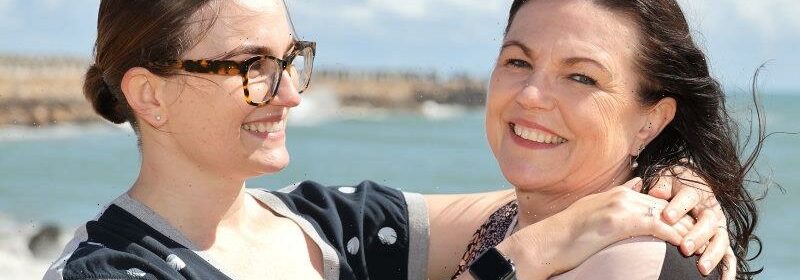Australia’s first uterus transplants to start next year

Australia’s first uterus transplants are due to take place next year, with two hospital trials investigating whether women born without a uterus – or who have had the organ removed or damaged – can carry a child.
Coffs Harbour dental receptionist Kirsty Bryant, 29, is one of 12 women who will receive transplants through a trial at Sydney’s Royal Hospital for Women next year. She underwent an emergency hysterectomy after a haemorrhage in childbirth.
Her 53-year-old mother Michelle Hayton is her donor.
Kirsty Bryant, right, will receive one of Australia’s first uterus transplants from her mother, Michelle Hayton.Credit:Frank Redward
The pair will travel from Coffs Harbour to Sydney early next year to participate. Hayton’s surgery will last four to 10 hours, while the transplant takes two to four.
“My mum is my best friend, and she is so generous to go through this with me,” said Bryant, who wants to be able to carry a sibling for her daughter.
For Hayton, the opportunity for Bryant to “grow her child in the same room she grew in” took a while to get her head around, but she is an enthusiastic participant.
“It was hard watching Kirsty go through what she did the first time, and I know she could still reject the transplant,” she said.
Over five years, researchers will follow the progress of six transplants from live donors – all known to the women taking part – and six from deceased donors to be recruited during the year.
Dr Rebecca Deans, the gynaecologist leading the trial, said it would include women born without a uterus, as well as women like Bryant who have had their uterus removed for medical reasons.
The trial is one of two similar programs in Sydney. A Royal Prince Alfred Hospital trial exclusively focused on live donors is currently recruiting participants.
The first successful uterus transplant occurred in Sweden in 2012. More than 70 successful transplants have since taken place in Europe and the US, leading to 40 live births.
Results abroad have shown a slightly above average rates of premature birth and the pregnancy condition pre-eclampsia in babies born following a transplant. However, it is expected women taking part in the trial who fall pregnant will be able to give birth in their local hospital.
Professor Mats Brannstrom, who pioneered the original Swedish program, will travel to Sydney to oversee the transplants.
Although Hayton is 24 years older than her daughter, if all goes well, her uterus will return to behaving like that of a younger woman by menstruating and preparing for pregnancy, Deans said.
“What the uterus itself does is determined by the hormones it is exposed to, which are delivered through the ovaries,” Deans said. The preference is for donors who are yet to reach menopause.
“The years beyond menopause make a difference, because the uterus is kept in better condition by those hormones.”
The Royal Australian and New Zealand College of Obstetricians and Gynaecologists does not have a position statement on uterus transplants. An article published in the college’s O&G magazine last year described support for the procedure as “variable amongst practitioners and the wider community”.
Macquarie University bioethicist Associate Professor Mianna Lotz, whose research focuses on the ethics of uterus transplants, said the ethical issues arising from the procedures were “quite unique and distinct from other forms of transplantation”, as it is not a life-saving operation.
“As a society we tend to place a lot of importance on assisting women and couples to overcome infertility and achieve their reproductive goals, including experiencing pregnancy and having a child that is biologically related to them,” Lotz said.
“For some women, uterus transplantation is the only way in which they can realise their specific reproductive goals. Being able to do so may not be essential for their bodily survival, but many describe it as essential for their mental health and for their sense of value in their lives.”
Lotz, who has provided independent ethical advice for the trial, said there were also specific ethical issues with altruistic donations, notably the possibility donors could feel pressured into donating their organs and a possible sense of guilt or failure if the procedure does not go to plan.
Because women taking part in the trial must be on strong immunosuppressant medications to ensure their body does not go into rejection, the uteruses will be removed at the end of the five years, which researchers said would give women the possibility of having two live births.
While she hopes she will fall pregnant, Bryant is realistic the procedure might not work, and will likely pursue other avenues if necessary to give her now 18-month-old daughter, Violet, a sibling.
“It doesn’t make me any more of a parent, being able to carry a child, but I remember when I had my daughter: that journey you go on, it’s just so special,” she said of wanting to be pregnant again.
“But, regardless, it would also give me a bit of closure if my hysterectomy could benefit other women and research in that way.”
The Morning Edition newsletter is our guide to the day’s most important and interesting stories, analysis and insights. Sign up here.
Most Viewed in National
From our partners
Source: Read Full Article
